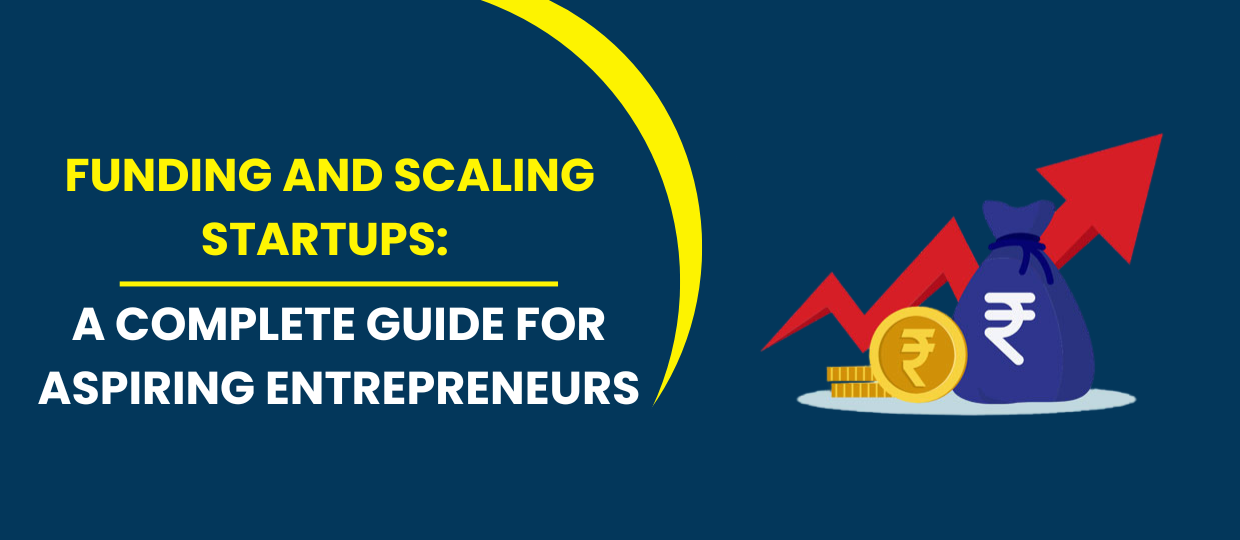
Every groundbreaking company begins with a spark, sometimes in a hostel room, a garage, or a midnight brainstorm. From Flipkart’s early days in Bengaluru to Tesla’s global revolution, one truth remains universal: the strength of any idea lies in its execution.
The Twin Pillars of Entrepreneurship: Funding and Scaling
Execution stands at the intersection of two critical pillars: Funding and Scaling.
Capital gives wings to an idea, while scaling ensures sustained flight. Neither are one-time milestones but ongoing tests of an entrepreneur’s resilience, adaptability, and strategic thinking.
The Funding Landscape: Turning Ideas into Reality
Before any product reaches customers, founders face a fundamental question: “How do we fund this?”
Funding isn’t just about raising money; it’s about finding the right capital at the right time from the right source, aligning perfectly with the company’s vision.
Bootstrapping: Building with Belief
Bootstrapping means self-funding using personal savings or small loans from friends and family.
Startups like Zoho and Mailchimp proved that a strong product and disciplined operations can create success without external investment.
Advantages:
- Retain full ownership and control
- Promote financial discipline
- Faster and independent decision-making
Challenges:
- Slower expansion
- Limited resources during the early stages
- Higher personal financial risk
Bootstrapping drives creativity, forcing founders to innovate not just in products, but in how they run their business.
Angel Investors: Catalysts for Early Growth
Angel investors, experienced professionals who invest their own funds, play a vital role in nurturing early-stage startups.
They bring not only financial backing but also mentorship and strategic direction.
Advantages:
- Early funding when others hesitate
- Real-world guidance and mentoring
- Access to business networks
Angel investors often back founders with a working prototype, pilot success, or initial market traction proving that an idea is worth believing in.
Venture Capital: Fuel for Rapid Expansion
When startups are ready to scale quickly, venture capital (VC) becomes a key enabler. VC firms provide significant funding, strategic alliances, and credibility. Success stories like Byju’s and Swiggy highlight how VCs help transform startups into market leaders.
Advantages:
- Enables aggressive market expansion
- Offers strategic and operational expertise
- Enhances brand credibility
Trade-offs:
- Partial loss of ownership and control
- High performance expectations
- Potential misalignment of values
Venture capital demands structure, discipline, and a transparent growth plan.
Crowdfunding: Power to the People
Crowdfunding platforms like Kickstarter, Indiegogo, and Ketto let startups raise funds directly from the public.
Products like Pebble watches, which raised over $10 million, proved that compelling storytelling and community engagement can drive large-scale funding.
Advantages:
- Builds an early community of supporters
- Validates the market before full-scale production
- Encourages organic promotion through shared belief
Crowdfunding thrives on emotional connection and transparent communication.
When to Raise Funds and When to Wait
The best entrepreneurs know when not to raise money.
External funding is most effective when:
- The business model is validated
- The team is capable and committed
- Demand exceeds current capacity
- Funds will accelerate planned growth
If these aren’t in place, delaying funding can preserve ownership and long-term control.
The Art of Pitching
A great pitch is more than numbers; it’s a story that earns trust. Investors invest in people as much as in products.
Winning pitch elements:
- Start with a compelling story.
- Present a unique, scalable solution.
- Share clear, simple metrics.
- Highlight the team’s expertise.
- Be transparent about risks.
- End with a bold, inspiring vision.
A balance of logic and passion wins both hearts and capital.
Scaling: Growing Smart, Not Just Fast
Funding helps you start, but scaling defines your legacy. Sustainable scaling means expanding wisely with the right strategy, structure, and values.
Principles of sustainable scaling:
- Build a strong, adaptable team.
- Plan operations early.
- Keep customers at the core.
- Invest in technology and automation.
- Balance revenue with stability.
- Evolve from founder to leader.
The success stories of Amazon, Nykaa, and Meesho show that scalability requires both discipline and vision.
Beyond Capital: The Essence of Entrepreneurship
In an age obsessed with funding rounds, it’s easy to forget that money doesn’t build companies, people do.
As Steve Jobs once said, “Half of what separates successful entrepreneurs from the non-successful ones is pure perseverance.”
Capital opens doors, but vision, values, and leadership keep them open.
Entrepreneurship Development at Career Point University
At Career Point University, entrepreneurship is more than a concept; it’s a culture.
Through its Entrepreneurship Development Cell (EDC), CPU nurtures innovation by guiding students from ideation to execution. The cell regularly organizes workshops, mentorship programs, funding sessions, and innovation expos like INNOFUSION, enabling young entrepreneurs to connect their creativity with real-world business opportunities.
By equipping students with practical knowledge of funding, scaling, and startup management, CPU’s EDC empowers them to build businesses that inspire, impact, and endure.




